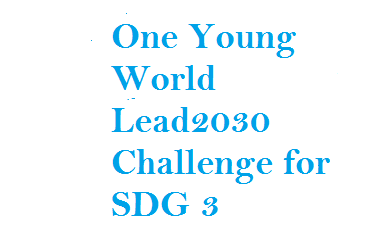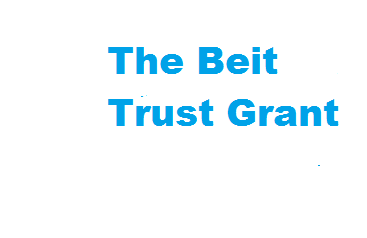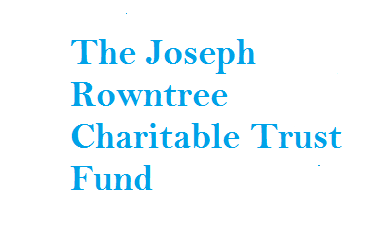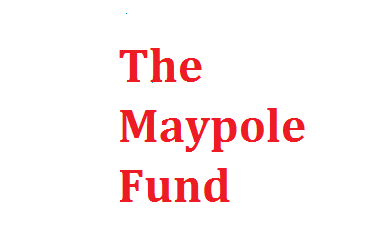One Young World Lead2030 Challenge for SDG 3
Deadline: 2022-11-30Posted On: 2022-11-08 07:49:44 , By Admin

About
Climate change and non-communicable diseases (NCDs) are two defining challenges of the 21st century, each posing significant threats to health and sustainable development. Globally, air pollution causes 7 million premature deaths each year, including more than 5 million caused by NCDs related to air pollution(1). This makes air pollution the second leading cause of deaths from NCDs. The WHO estimates that 9 out of 10 people breathe air that exceeds WHO guideline limits and contains high levels of pollutants, with low- and middle-income countries suffering from the highest exposures(2).
Worldwide, 1.8 billion people under the age of 15 breathe air that is so polluted that it risks their health and development(3). Children and young people are more affected by air pollution than adults, and long-term exposure to air pollution can lead to changes in brain structure which may disrupt learning and cognition. In addition to cardiovascular- and respiratory-related NCDs, evidence is emerging of other effects of air pollution, such as diabetes, neurological development issues in children and neurological problems in adults, according to WHO(4). Indoor air pollution, caused primarily by the use of polluting fuels, has a particular impact on women as the responsibility for cooking and collecting fuel are often considered the woman’s domain (5). As a result of this, household air pollution stands as the fifth leading risk factor for morbidity among women in low and middle income countries, whereas it is ranked eighth among men (6).
Along with harming human health, air pollution can cause a variety of environmental effects which exacerbates climate change, contaminates ecosystems, and kills plants and animals(7).
For this Challenge, we are seeking innovative, youth-led projects which tackle the causes of air pollution and focus on the long-term health of young people. What we are looking for:
- Projects which focus on individual behaviour change, new technologies, or multi-stakeholder advocacy approaches to change laws/policies.
- Sustainable solutions which can be scaled up to be implemented in other communities
- Projects should focus on cities or communities with high levels of air pollution or pollution-related illness. A preference will be given to projects which operate in a low- or lower-middle- income country or setting.
- Projects should be youth-led, where young people (30 and under) are involved in the design or delivery of the initiative, and where the long-term health of young people is at the heart of the solution.
- Projects should also focus equally on tackling air pollution (indoor or outdoor) and its link to long-term health.
- Projects with a focus on the health of women and girls are preferred.
Note on eligibility:
This Lead2030 Challenge will be supported by AstraZeneca’s Young Health Programme. To be eligible for this grant, the funding must be payable to a registered non-profit organisation that is accountable for delivering the project.
Projects cannot incorporate treatment of medical conditions or the promotion or prescription of medicines but should instead focus on the promotion of healthy lifestyle behaviours and the prevention of disease.
Criteria
Aligned: Evidently aligned with the challenge. See ‘About’.
Youth-led: Founded and led by a person aged 18 – 30.
Focused: Well-structured time horizon, identified key stakeholders and beneficiaries, and proposed outcomes that are reasonable and well thought out.
Market ready: Product/service already in market or ready to go to market.
Impactful: Solutions must have a positive social impact, creating legislative change or measuring behaviour change.
Measurable: Impacts of solutions must have been adequately measured and/or be measurable.
Financially viable: Must be able to achieve efficiency and to survive independently through the resources they generate and/or the investments and donations they attract.
Scalable: Potential to perform as well or better after expanding in scope or size and/or being transported to other regions.
Location: a preference will be given to projects which operate in a low- or lower-middle- income country or setting. Projects should also focus on cities or communities with high levels of air pollution or pollution-related illness.
Additional Criteria:
This Lead2030 Challenge will be supported by AstraZeneca’s Young Health Programme. To be eligible for this grant, the funding must be payable to a registered non-profit organisation that is accountable for delivering the project.
Projects cannot incorporate treatment of medical conditions or the promotion or prescription of medicines but should instead focus on the promotion of healthy lifestyle behaviours and the prevention of disease.
The project must be delivered by a registered non-profit organisation which is able to pass due diligence and verification checks. This will include documentation to ensure the projects meet legal requirements on international charitable donations. You must complete this stage before the grant payment is made. Documents may include a copy of your organisation’s governing document (eg articles of incorporation), a certificate of charitable registration in your country, most recent annual financial accounts, a bank statement from the last 3 months as proof of your organisation’s bank account, and details of your Trustees/Directors’ full names, residential addresses and dates of birth.
Prize
The winning solution will receive:
- A US$50,000 grant from AstraZeneca Young Health Programme
- 12 months of mentorship from a team of AstraZeneca Young Health Programme professionals. The mentorship team will work to accelerate your solution based on the needs of your initiative or organisation, such as:Participation in the One Young World Summit 2023 in Belfast. Flights and accomodation included.
- Business strategy
- Best practices for data collection
- Monitoring and evaluation
- Product design
- The opportunity to join AstraZeneca’s Young Health Programme (YHP) Alumni Group. The YHP Alumni Group offers learning and development opportunities and networking between Grantees as well as young leaders who have received YHP Scholarships. In the past, Alumni Members have been offered mini-MBA programmes, opportunities to share their work with global audiences, and masterclasses on fundraising and digital skills to build effective health-promotion programmes.
- Visibility and promotion by AstraZeneca’s Young Health Programme and the One Young World team
Timeline
- 30 November 2022: Applications close.
- 15 December 2022: Shortlisted candidates confirmed and invited to submit second round application.
- 5 January 2023: Second round application deadline.
- 1 - 15 February 2023: Candidate interviews.
- 25 February 2023: Challenge Winner confirmed.
Get support to apply this project click on: Submit Form
You may like similar funds
The Beit Trust Grant
 Deadline: 2022-11-30
Deadline: 2022-11-30
Who Are We?
The Beit Trust is an independent charity. We support people and communities in Zambia, ...
The Joseph Rowntree Charitable Trust Fund
 Deadline: 2022-11-14
Deadline: 2022-11-14
About
The Joseph Rowntree Charitable Trust is a Quaker trust which supports people who address the ...


